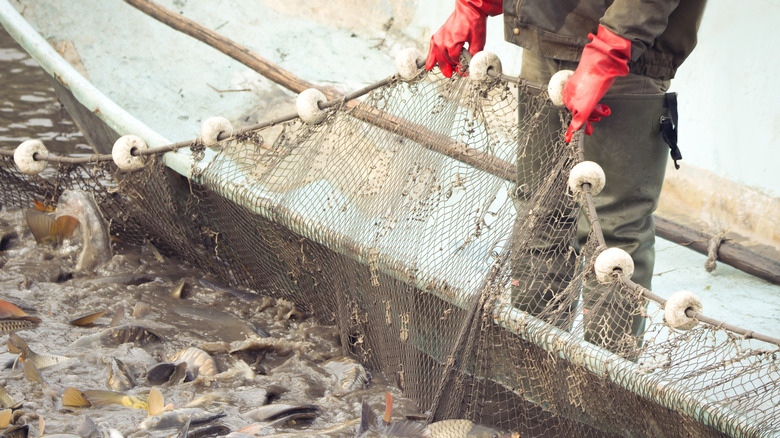Study Finds How A Toxic Chemical Can Make Freshwater Fish Harmful To Your Health
Freshwater fish caught in U.S. lakes and rivers contain dangerous levels of "forever chemicals" that can be damaging to our health, a new study published in Environmental Research revealed yesterday.
The data — collected by the Environmental Protection Agency (EPA) between 2013 and 2015 — examined 500 composite filets, including catfish, perch, walleye, and bass, derived from the nation's freshwater supply. Researchers determined that, within their flesh, fish carried significant levels of perfluorooctane sulfonate (PFOS) — a synthetic toxin that the federal government phased out in 2002 (per U.S. Department of Health and Human Services).
PFOS are members of a chemical group called perfluoroalkyl and polyfluoroalkyl substances (PFAS) — which manufacturers across the globe have been using to make heat, water, grease, oil, and stain-resistant coatings (think non-stick pans and stain-resistant fabrics) for products since the 1950s (per CNN). Also known as "forever chemicals," PFAS cannot be broken down by the environment in the same way as other chemicals, allowing them to survive for over a thousand years (per PFAS Free). Through the production, use, and disposal of these products, PFAS enter the environment and, thus, the water supply, where they eventually make their way into the foods we eat.
How PFAS affect your health
Harvard T.H. Chan School of Public Health explains that exposure to PFAS has been linked to health issues ranging from cancer and liver damage to asthma, thyroid disease, and decreased fertility. For that reason, the EPA currently maintains that in order for drinking water to be considered safe, PFAS levels must remain below .02 parts per trillion (per E&E News). However, the median PFAS levels detected in fish pulled from U.S. rivers and streams were a staggering 9,500 nanograms per kilogram — and those numbers were even higher in fish caught in the Great Lakes.
David Andrews, a senior scientist and one of the authors of the study, told The Hill, "You'd have to drink an incredible amount of water — we estimate a month of contaminated water — to get the same exposure as you would from a single serving of freshwater fish."
The study's authors indicate that people living in water-bordering communities — who rely heavily on fishing for sustenance — are particularly affected by these findings.


